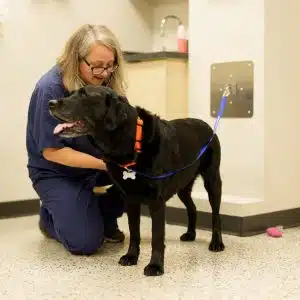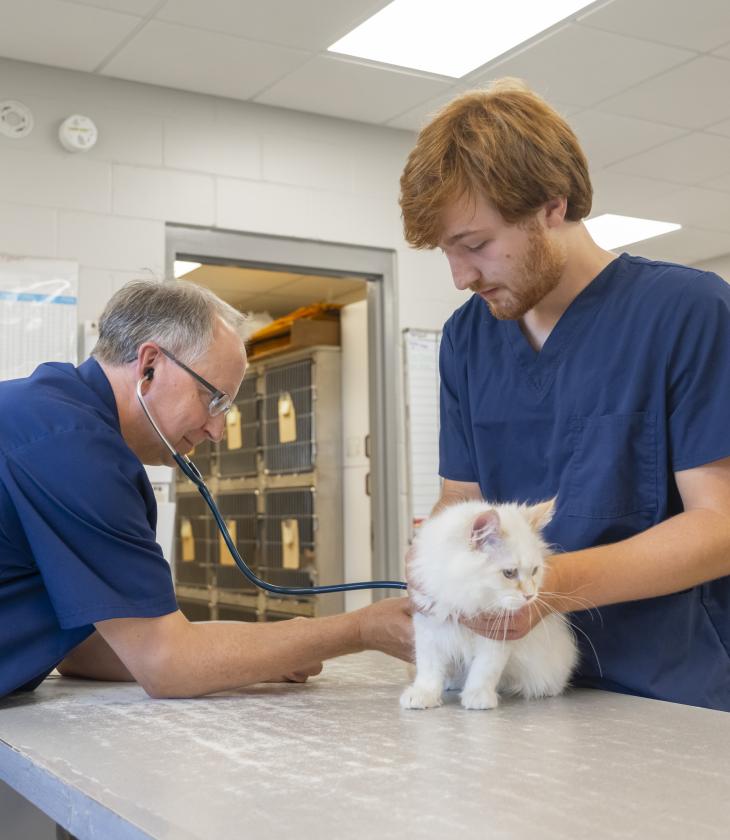Key questions your Board Certified Veterinary Oncologist during your initial appointment
Wiki Article
Exactly How a Veterinary Oncologist Can Aid Improve Your Animal's Lifestyle
Veterinary oncologists focus on the diagnosis and therapy of cancer cells in animals, playing an essential role in enhancing their quality of life. They create tailored treatment strategies that attend to the distinct needs of each animal. With advanced diagnostics and targeted treatments, these specialists intend to take care of signs effectively. The journey does not end there. Checking out the full range of treatment alternatives reveals more about how these specialists can make a substantial difference.
Comprehending the Duty of a Vet Oncologist

In enhancement to diagnosis, vet oncologists establish thorough therapy methods tailored to the demands of each pet. These methods may consist of radiation treatment, radiation treatment, and medical interventions, targeted at not only expanding survival yet additionally enhancing the general lifestyle. They offer palliative care, concentrating on pain monitoring and comfort for family pets dealing with incurable diagnoses. By working together with pet proprietors, vet oncologists guarantee that pets get one of the most caring and effective treatment feasible during their cancer cells journey.
Customized Therapy Strategies for Your Animal
When a pet is identified with cancer, developing a customized treatment strategy ends up being necessary for addressing their distinct requirements and circumstances. A vet oncologist thoroughly assesses the kind of cancer, its phase, and the general health and wellness of the animal. This detailed analysis permits for the creation of a tailored technique that may consist of a mix of chemotherapy, surgical treatment, and radiation therapy.The oncologist also thinks about the family pet proprietor's choices and lifestyle, ensuring that the strategy lines up with their objectives for their pet's treatment. Veterinary Oncologist. Therapy strategies are not fixed; they are routinely evaluated and adjusted based on the animal's feedback and any type of arising demands. By concentrating on individualized treatment, vet oncologists intend to enhance the effectiveness of therapies while preserving the pet dog's quality of life. This individualized technique promotes a better understanding of the illness, empowering family pet proprietors to make informed decisions regarding their precious friends' health
Taking Care Of Symptoms and Adverse Effects
Handling the symptoms and negative effects of cancer treatment is a vital element of vet oncology. Veterinary oncologists utilize a range of approaches to minimize discomfort and boost the overall well-being of pets undertaking therapy. This might consist of the usage of anti-nausea drugs to battle vomiting and anorexia nervosa, which are common negative effects of radiation treatment. Pain monitoring is additionally focused on, typically involving the prescription of anesthetics customized to the animal's specific requirements.On top of that, oncologists might recommend nutritional changes, including top notch, easily absorbable foods to sustain nutritional intake. Keeping track of blood job is important to find any kind of adverse responses to therapy early, allowing for timely treatments. Routine follow-ups allow the vet group to examine the pet's reaction to therapy and make essential changes. Via these comprehensive strategies, vet oncologists intend to boost the quality of life for pet dogs facing cancer cells therapy challenges.
Palliative Care and Comfort Actions
Palliative treatment plays an important duty in improving the lifestyle for animals diagnosed with cancer cells, concentrating on comfort and psychological assistance instead of curative therapy. Vet oncologists prioritize discomfort management, guaranteeing that pet dogs experience minimal discomfort during their illness. This includes using analgesics, anti-nausea medications, and other treatments tailored to private demands.In addition to medicinal treatments, environmental alterations can substantially boost an animal's lifestyle. Developing a calmness, comfortable area with soft bedding and very easy accessibility to food and water can relieve stress. Nutritional support is additionally important; oncologists may recommend specialized diets that accommodate the pet dog's needs and preferences.
Emotional support for both the family pet and its proprietors is essential. Vet oncologists give advice on coping approaches, assisting households navigate the psychological challenges that come with a cancer cells diagnosis. Eventually, palliative care purposes to assure that family pets get the dignity and convenience they are worthy of.
Working together With Your Normal Vet
Cooperation with a regular vet is important for maximizing the care of family pets with cancer, as this partnership ensures a complete approach to treatment and lifestyle. The normal vet normally has a detailed understanding of the family pet's case history, which is important when formulating a therapy strategy. They can efficiently connect with the vet oncologist, making certain that all facets of the pet's health and wellness are considered.This partnership permits coordinated care, which may include normal check-ups, checking side results, and changing medications as needed. Regular vets can also provide emotional assistance to animal proprietors, helping them browse the complexities of cancer cells therapy - Pet Cancer Surgery. By working very closely with vet oncologists, they can facilitate a seamless change between different kinds of treatment, making certain that family pets get one of the most reliable therapies while preserving their convenience and wellness throughout the process. Together, they boost the total lifestyle for family pets encountering cancer cells
Frequently Asked Inquiries

What Kinds of Cancers Cells Do Vet Oncologists Normally Treat in Pet Dogs?
Veterinary oncologists Veterinary Oncologist normally deal with various cancers in pet dogs, consisting of lymphoma, pole cell lumps, osteosarcoma, and soft cells sarcomas. These specialists utilize innovative diagnostic techniques and treatment alternatives to attend to the particular demands of each animal.Just How Can I Prepare My Animal for a Vet Oncology Visit?
Preparing a pet dog for a veterinary oncology consultation includes event clinical documents, noting signs, and preparing inquiries. Guaranteeing the animal is comfy and tranquil throughout traveling can additionally significantly improve the total experience and consultation performance.Are There Any Type Of Different Therapies for Pets With Cancer cells?
Alternate therapies for animals with cancer cells often include acupuncture, natural medicine, and nutritional assistance. These methods might match conventional treatments, potentially enhancing overall wellness and providing encouraging treatment during the family pet's cancer trip.Just how Frequently Should My Pet See the Veterinary Oncologist?
The regularity of visits to a veterinary oncologist generally relies on the family pet's particular problem and treatment plan. Normal evaluations might be advised every couple of weeks or months to monitor development and adjust therapies as necessary.What Prices Are Related To Veterinary Oncology Solutions?
Prices related to veterinary oncology solutions can vary commonly, including preliminary consultations, analysis examinations, treatment plans, and continuous treatment. Veterinary Oncology Services. Family pet owners need to prepare for potential expenses that mirror the complexity and period of the treatment requiredVeterinary oncologists specialize in the diagnosis and treatment of cancer in animals, playing an essential function in boosting their quality of life. Lots of animal owners may not be acquainted with the ins and outs of veterinary oncology, comprehending the duty of a vet oncologist is crucial for handling cancer in pets. The oncologist likewise thinks about the animal owner's preferences and way of life, making sure that the plan lines up with their goals for their pet's care. By concentrating on individualized care, vet oncologists intend to enhance the performance of therapies while keeping the pet's high quality of life. By functioning very closely with veterinary oncologists, they can assist in a seamless shift in between various types of care, making certain that pet dogs receive the most effective therapies while maintaining their convenience and well-being throughout the process.
Report this wiki page